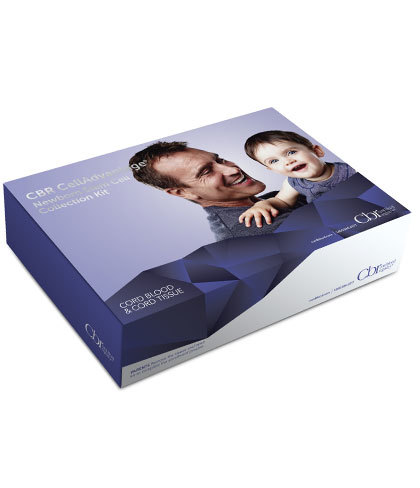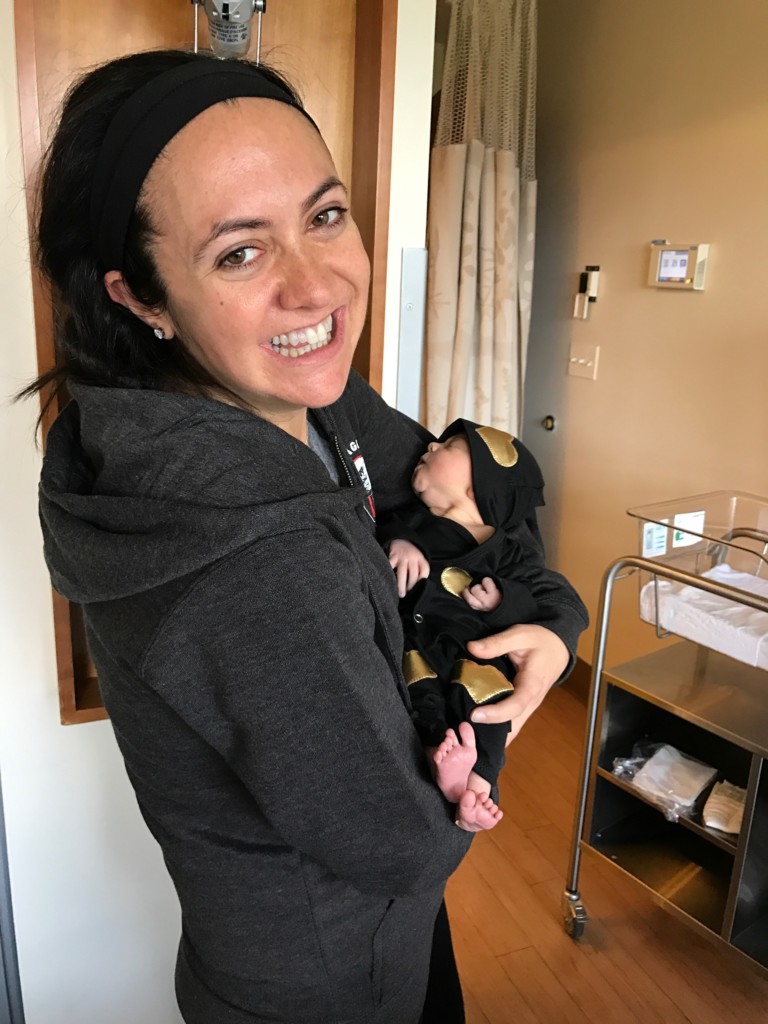An Expectant Parent’s Guide for Whether to Do Umbilical Cord Blood Banking and a Review of CBR: Cord Blood Registry
*I was given a substantial discount on cord blood collection for purposes of this review, but was not compensated in any other way*
At one of my later doctor’s appointments I was asked if I wanted to retain my baby’s cord blood. I had no idea what they were even talking about. After asking some questions and doing some research I learned that cord blood is taken from a newborn’s umbilical cord right after birth. Cord blood is useful because it’s a rich source of stem cells that can be used to treat a range of conditions including several types of cancer, blood disorders and immune disorders. There is also a ton of research currently to find other future applications for cord blood banking. Basically, cord blood is such a valuable source of stem cells because it’s young and undamaged—not marred by age or other environmental factors. So now I had to determine whether or not we thought we should do cord blood banking. And that’s when I decided I wanted to write a review about my experience so I could guide and help new parents to help see if cord blood banking is right for their family.
I took off on my task to determine if I thought collecting cord blood would be something we needed to do for our daughter. I called several of the top companies I found from my research online. I finally called CBR, Cord Blood Registry, which was the company recommended to me by my doctor’s office “if I wanted to do collection of cord blood.”
Before I get into how impressed I was with CBR (do note that I ended up getting the cord blood for free) I will tell you why I was so torn. Cord blood is not a small expense. Depending on what company you choose and whether you collect just cord blood and or cord blood and tissue collection, prices start at about $1500 and also have an additional annual storage fee (which starts at about $150). Most companies do offer payment plans to make it affordable for all families.
I was immediately really impressed with CBR’s staff. First of all, they have certified genetic counselors available to speak to you and answer questions so that you can make informed decisions based on your medical history. I was overly impressed with every staff member’s knowledge but also their passion for the company and cord blood in general. It’s so unusual to call a company and speak to intelligent people and not just folks who man the phone lines.
When the genetic counselor called, we discussed my entire medical history and family’s history because I was curious what issues may be helped by cord blood. I wanted to know what potential applications there were and just get a better understanding for its uses. After two phone calls, I felt like I really understood the entire process.
I also really liked CBR because of all of the innovative research with cord blood stem cells that they are working on now. Their mission is to be able to help children with serious conditions. I was more convinced than ever when I learned about CBR’s Newborn Possibilities Program, which offers families (with qualifying medical need) free cord blood processing and five years of storage for cord blood and cord tissue. You can speak to a genetic counselor if you think you may qualify.
While we’re discussing getting things for free, I want you to know that I received a discount from CBR for sharing my experience on my blog. I would like to note though that I was the one who reached out to CBR after my doctor recommended CBR and I conducted my own independent research and called a couple other companies. I have not received any other compensation by the company nor do I receive commission if you end up choosing to work with CBR. I am honestly just trying to help other confused new parents-to-be out there muddle through this crazy world of decisions. After all, we’re not all genetic researchers and most of us aren’t made of money.
So, we decided to use CBR what’s next? Well, once you make the decision, it’s really simple. A few weeks before your due date (I received it basically right after I signed up) you receive a collection kit in the mail (pictured above). A member of CBR’s staff followed up with me shortly after to ensure the package was delivered and was in good condition. I could ask any questions then about what to do, which was nice.
I then placed the box, which has everything your doctor needs for collection in my hospital bag so I wouldn’t forget it. You should tell your doctor in advance that you are planning to collect the baby’s cord blood to make sure they’re familiar with the process, which most doctors (at least in New York City) are.
When I went into labor, I brought my birth plan, which we typed out in advance, to give the doctor. On there, I reminded them once more that we were collecting the blood and gave her the package, which she placed with the rest of the medical supplies.
Then voila, I delivered and she collected the sample after the umbilical cord was cut. I think it’s worth noting that you can even do collection after delayed cord clamping. I had my husband call the courier service (which is included in the price). The courier came in less than an hour (and it was at 1am on a Sunday night so don’t worry about delivering on the weekend). The blood was then shipped and sent to CBR for testing.
Several weeks later I received a call from CBR’s doctor to discuss my daughter’s results. They talked to me about how many cells were collected and the viability. They also had some bad news, which is that the sample was contaminated. As a new mom with raging hormones, my immediate reaction after shock was devastation. They told me that this happens only in a few percent of the samples and that it was no one’s fault (i.e. not the doctor). CBR’s doctor walked me through what this meant and explained that if I wanted to I did not have to store the sample and could have a refund. She explained though that even though it was contaminated that it was still viable for many applications should we need the sample. As a mother and doctor, she gave me her opinion and when I hung up the phone I had decided to keep the sample (which I will have to continue to pay for storage moving forward).
Here is my advice about how to make the decision that’s right for your family. Well, if money is no object, I would definitely do cord blood banking. But for the majority of us who don’t have millions, I would first, consider the likelihood that you’ll need or be able to use these cells. If you have a family history of a disease that is treatable with cord blood, it seems like a wise choice to bank the cells. Next, I would consider that while your baby may use his or her own cells for certain diseases, siblings are more likely to potentially benefit from the cells and be a compatible match (with a 25% chance of offering a perfect match).
You can also consider the likelihood of future uses as a potential benefit of storing these stem cells. Many articles suggest that as medical research moves forward, cord blood will become even more useful. While this isn’t certain, my ultimate conclusion was that that if my family could afford to do so, I wanted to give myself and our family more medical opportunities and avail ourselves of any potential future benefits. I also accounted for the peace of mind it gave me that we would have it just in case (even if there isn’t a strong likelihood that we would need it).
When choosing what company to use for cord blood collection, make sure that you pick a reliable and professional company with a lot of experience. After all, you only have one chance to get collection right. Make sure the lab you choose is an accredited lab with an established history (public banks have to be accredited but private banks do not). You also want to check and make sure that the bank has a courier service and a history of actually releasing cord blood for use (meaning doctors are accepting and using the viable materials). If you choose not to collect and store your own sample, you should consider donating it (collection is totally painless and occurs after the cord is cut).
As I mentioned earlier, my doctor recommended working with CBR (Cord Blood Registry) and, after doing much research, I was really impressed with its process and team. I also valued that CBR partners with research institutions on FDA-regulated clinical trials, so I felt assured that they at the forefront in the advancement of the science of cord blood stem cells.
Disclosure: As mentioned above in detail, I received a discount in consideration for writing a blog post about my experience. However, I was not compensated in any other way.



